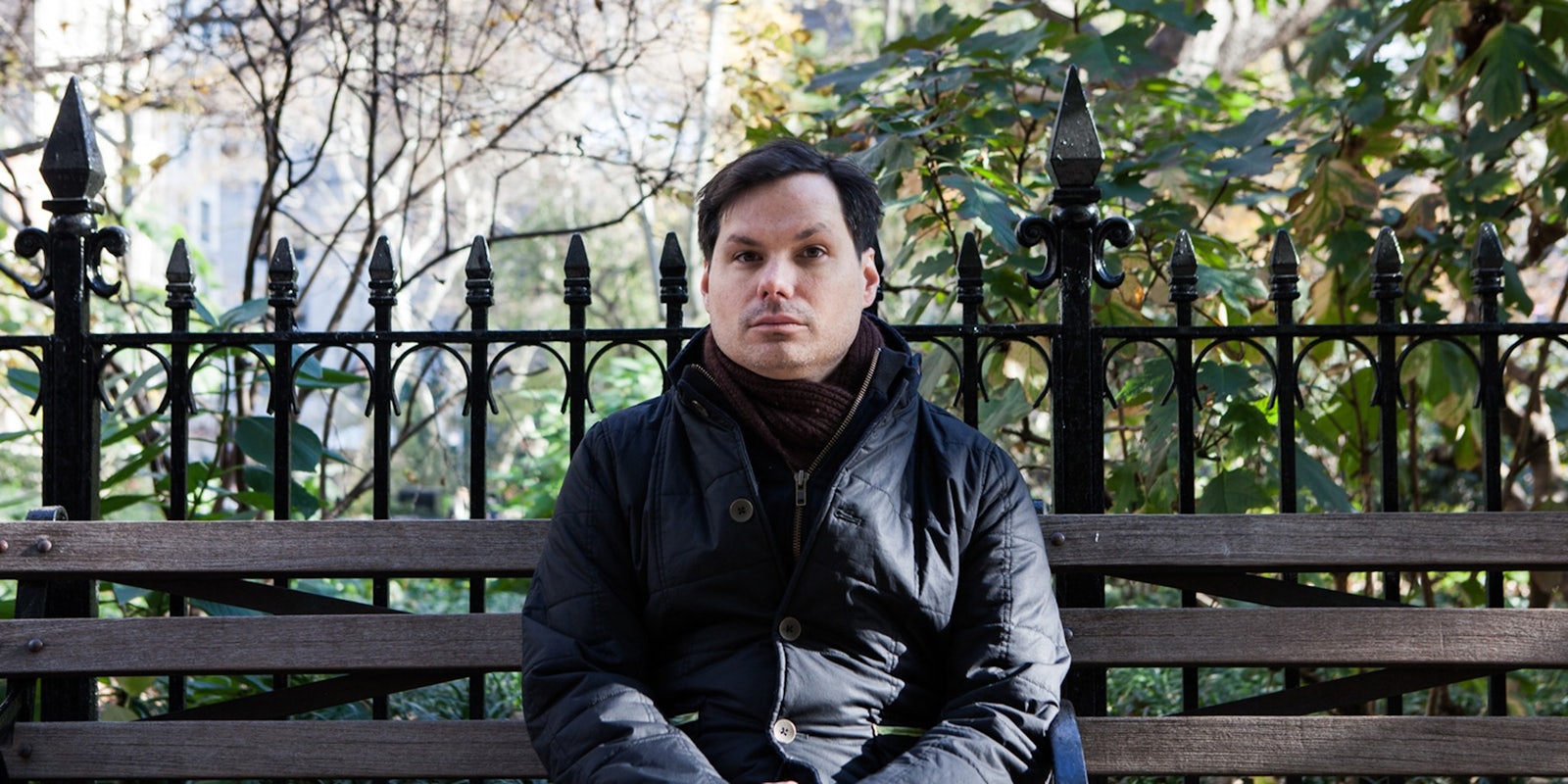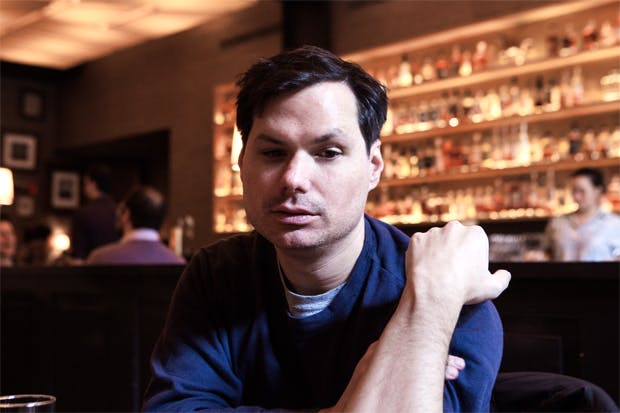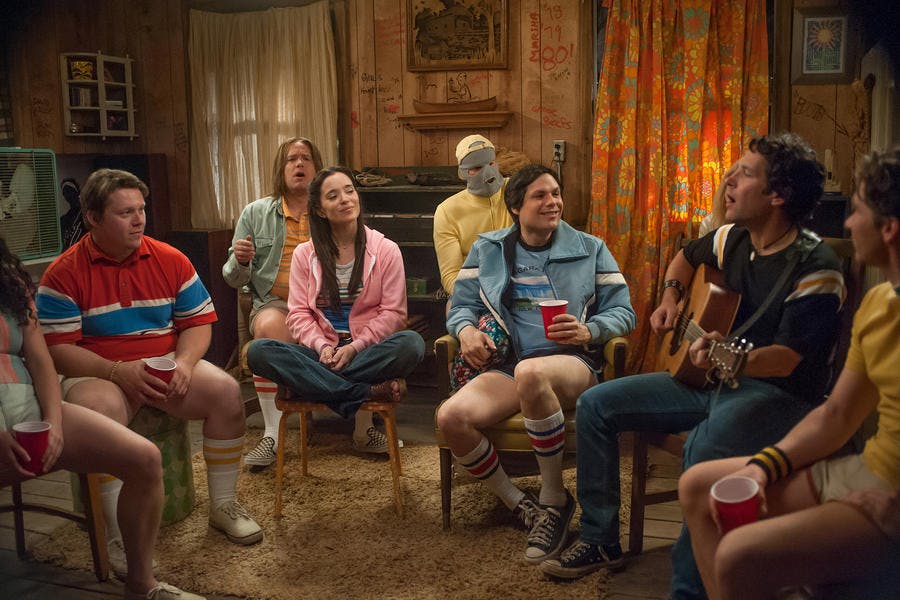Michael Ian Black does a doubletake. Our waiter has just instructed us to “hashtag enjoy your meals,” and I ask if that really just happened. “Yes, that is what happened,” he says. We hold back a laugh as the waiter walks away. This meeting isn’t meant to be funny—we’re here to talk politics—but few things are so cut and dry for Black.
“I do get offended when people are dismissive. ‘You’re a comedian, an actor, go back to whatever you’re doing,’’ Black tells me at an upscale Manhattan whiskey bar and restaurant in Manhattan’s Flatiron district. He’s dressed in a dark, long-sleeved T-shirt, and cracks a smile when I mention that we attended the same theater camp, but he keeps an unflinching poker face for most of our discussion over lunch.
“I’m not even so much offended for me than I am offended by the idea that you have to have some sort of occupation to have a voice, politically, because you can say the same thing about everybody except—what?—politicians? Then who’s allowed to talk?”
“It’s the golden age of idiocy. We may never be blessed with this again.”
Black, the 44-year-old comedian and one of the stars of the summer’s Netflix hit Wet Hot American Summer prequel, is not staying quiet—especially on Twitter, his battleground of choice. The challenge is to keep debates civilized on a platform known for snark and brutishness in 140 characters—especially now, a particularly troubling time, both for Black and, he says, America at large.
Just days before Black drove to Manhattan to record his podcast, How to be amazing with Michael Ian Black, a couple had opened fire on a government agency’s Christmas party in San Bernardino, California, leaving 14 people dead and 19 wounded. That massacre came less than a week after a gunman shot up a Colorado Planned Parenthood clinic. Black’s Twitter account was burning with the debate over gun violence because it’s an issue that hits close to home.
He and his family live 10 minutes from Sandy Hook Elementary School in Newtown, Connecticut, where a gunman opened fire in 2012, leaving 20 students and six adult staffers dead. As we enjoy our identical meals of smoked trout and watercress, he tells me that the memory of that day still haunts him.
“My kids’ schools were on lockdown,” he says. “Nobody knew what was happening.”
The carnage at Sandy Hook served as a watershed moment for Black, solidifying his staunch views on gun control. “I don’t think an event like that can do anything but affect you. I was already leaning one way, and it pushed me further in that direction,” Black says.
During what feels like a particularly violent year in America, Black has turned to his Twitter audience of nearly 2 million followers to have an open and honest dialogue about everything from Donald Trump’s views on Muslims to the Syrian refugee crisis. But it’s gun violence that has become a mainstay on his timeline.
“I am absolutely politicizing this. I am absolutely not going to wait,” Black says of the anti-gun violence Twitter crusades he’s gone on lately. He speaks these words through closed eyes, as if mention of the topic conjures the weight of another cable news flash. “There is absolutely no such thing as ‘too soon,’ because the conversation only happens during these fleeting moments, and so this is the opportunity we have.”
Proponents of increased armament, he says, believe that more guns equals fewer gun deaths, a position that sits on a whole other world from both Black’s views and reality.
So how can a man who’s so staunchly anti-gun hold a coherent conversation with a person on the opposite end of the argument? Black disarms his critics with a secret weapon of his own: facts.
An average of 30,000 Americans died from gun-related injuries from 2005 to 2015, PolitiFact reports. Nearly half of those deaths are ruled suicides, a detail Black says is still indicative of a problem, but one that muddies the gun control issue. That’s how he arrived at the number of 15,000 gun deaths in the U.S. each year. It’s this number that leads to his first question for opponents of gun control: “Is that an acceptable number to you?”
“I haven’t heard anybody yet say, ‘Yes, that’s an acceptable number,’ although I suspect some people believe that,” Black says. “If you can arrive at that point of ‘Yes, I agree with you, that 15,000 gun deaths per year in this country is too many gun deaths,’ well then, there’s the natural next question, which is, ‘What should we do to reduce the number of gun deaths?’”
https://twitter.com/michaelianblack/status/673007453957582848
https://twitter.com/michaelianblack/status/673007634518118400
https://twitter.com/michaelianblack/status/673007826499796992
Gun violence remains a hot-button issue for most Americans. A recent Gallup poll found that gun violence came in fourth as the “most important problem facing this country today.” Terrorism took the top spot—despite the fact that terrorists have killed 71 Americans worldwide in the last decade, while homegrown gun violence has killed more than 300,000.
“There is absolutely no such thing as ‘too soon,’ because the conversation only happens during these fleeting moments, and so this is the opportunity we have.”
While the number of gun deaths remains relatively steady, the country’s views on gun control have flipped over the past 20 years, according to a 2012 Pew Research Center survey. Proponents of gun rights have overtaken gun control advocates by a slim margin, 49 percent to 45 percent.
“Once you agree that we should reduce the number of gun deaths, then you can start to have a conversation about why,” Black continues. “There will be a lot of differing opinions as to how we should do that, but at least you’ve arrived at that point of common ground.
“The number of accidents, suicides, domestic violence incidents have gone through the roof. We can do things about it. We can bring those numbers down. And so, yes, I’m passionate about it,” Black adds, “and I get a lot of beef for it.”
https://twitter.com/michaelianblack/status/674960988911837185
Last time I checked, drunk driving wasn’t a constitutional right, but sure, let’s try some people regulations first. https://t.co/QkrSV61xsb
— Ariel Lindosky (@lindosky) December 5, 2015
https://twitter.com/michaelianblack/status/673003261968822272
https://twitter.com/michaelianblack/status/672991833329307648
If you’ve been a Twitter follower of Black’s since he joined in 2009, then you may have noticed how his content has evolved. His feed, once filled almost exclusively with humorous 140-character quips—like “Per my wife’s request, did a little mulching this morning. She ignored my request to leave me the fuck alone.”—has turned to full-on political discourse. As a working comedian—in addition to Wet Hot American Summer, he stars in Comedy Central’s Another Period and USA’s The Jim Gaffigan Show—he still sprinkles in jokes on his follower’s timelines. But it’s impossible to ignore his commitment to going back and forth with oftentimes avatar-less Twitter users who just want to try and get a rise out of the liberal performer and author.
Black’s rise as a political voice arguably began in 2012, as he toured the country with Megan McCain (daughter of republican Sen. John McCain) while penning their book, America, You Sexy Bitch. But he actually realized the power of Twitter as a political tool three years earlier. According to a November New Yorker profile about Megan Phelps Roper, the former Westboro Baptist Church member and granddaughter of the church’s founder, Black reportedly plucked Phelps Roper out of her Twitter obscurity in 2009, when he stumbled across a tweet of hers and wrote “Sort of obsessed w/ @meganphelps. Sample tweet: ‘AIDS is God’s curse on you.’ Let her feel your love.” Suddenly, the Kansas native was exposed to a new universe of Twitter notoriety and the cacophony of opinions that goes with it.
It’s this potential that keeps Black on the Twitter grind: You never know who’s watching what you’re saying, and perhaps learning something.
Black’s political roots actually date back much further. His parents divorced when he was three, and his father passed away when he was 12, leaving his mother, Jill, to raise him and his sister Susan in Hillsborough Township, New Jersey. After the divorce, his mother came out as a lesbian, and Black was soon aware that two women could be intimate, which he details in his 2012 memoir You’re Not Doing It Right.
The word feminist begins creeping into daily conversations, a word I vaguely understand to mean “men are assholes.” My comprehension of the word will expand over time, and as I grow older, I will come to think of myself as a feminist, but at the time it feels like an angry word, often accompanied by the phrase “male chauvinist pig.” Although I never understand exactly what turns a man into a male chauvinist pig, I am pretty sure it’s a penis.
Black expands on his complex relationship with his mother and her uterine cancer diagnosis in his new book of stories, Navel Gazing (True Tales of Bodies, Mostly Mine but Also My Mom’s, Which I Know Sounds Weird), released this month. Despite his mother’s strong influence, Black says he was determined to form his own set of political ideals. “I had to figure out what my own first principles were and understand what I believed in order to understand where I came out,” he says. “I’m sure a lot of that was informed by my upbringing, the things that I believed. But it wasn’t necessarily a given to me, as I became more politically aware, that I was a Democrat. In some ways, I’m still not sure I am.”
“I don’t hope to change anybody’s minds that I’m arguing with. It’s never happened. I don’t think it ever will happen.”
A random and completely unscientific online quiz (the results of which your aunt might post on Facebook) served as something of a rude awakening for Black. “I was sort of embarrassed when I got the test results back because I’m like, ‘Am I really that much of a caricature of a bleeding heart liberal?’ And it turns out I am.”
It’s this idea of caricature the pervades Black’s feelings about politics. He uses the word to describe the one person who’s become impossible to ignore: Donald Trump. The Republican president candidate is leading the pack with 10 months left until the general election. Regardless of whether he gets his party’s nomination at the Republican National Convention next July, Black says that we’re already living in Trump’s America.
A vocal majority has come out in support of Trump during the early months of the campaign, imploring fellow voters to “Make America Great Again.” At rallies from Boston to Las Vegas, people are coming out en masse to hear Trump loudly take aim at whichever group he hates that week. In a way, Black is grateful to Trump for bringing them out of the shadows.
“Now, you’re raising your hand and you’re saying, ‘That’s who I am.’ It’s good to know,” says Black. “I’m glad you’re raising your hand so I know who you are. That’s helpful to me. You’re exactly who I thought you were, by the way, but thank you for confirming it.”
That awareness causes serious concerns for Black about the future of the country—and his own future here. “To me, the threat is to everything that I believed to be true about this country,” Black says, “and feeling like maybe I just don’t have a place here right now.”
https://twitter.com/michaelianblack/status/676476837724311553
So if Black already has his mind made up about Trump supporters and their ilk, why engage with them on Twitter day in and day out? “I feel like my only responsibility on Twitter is to myself, because to try to satisfy some nebulous, faceless crowd of people—almost none of whom I interact with—would be pointless,” Black says. He’s not perpetuating the discourse for the sake of the people who are reaching out to him.
“I don’t hope to change anybody’s minds that I’m arguing with. It’s never happened. I don’t think it ever will happen,” he says. “What I’m hoping is that somewhere, somebody’s reading that exchange, who maybe doesn’t have as militant opinion as I do or the person I’m arguing with does. And what I’m saying will help persuade that person in my direction.”
While keeping a cool head and a respectful tone are key parts to Black’s Twitter debate strategy, it often comes back to the one thing that gave Black his fame and millions of followers in the first place: a sense of humor.
“It’s the golden age of idiocy,” he says. “We may never be blessed with this again.”
Photos by Alex Welsh




